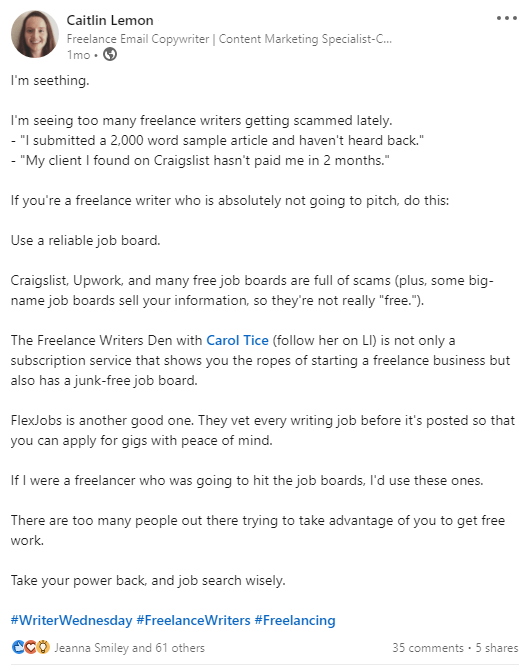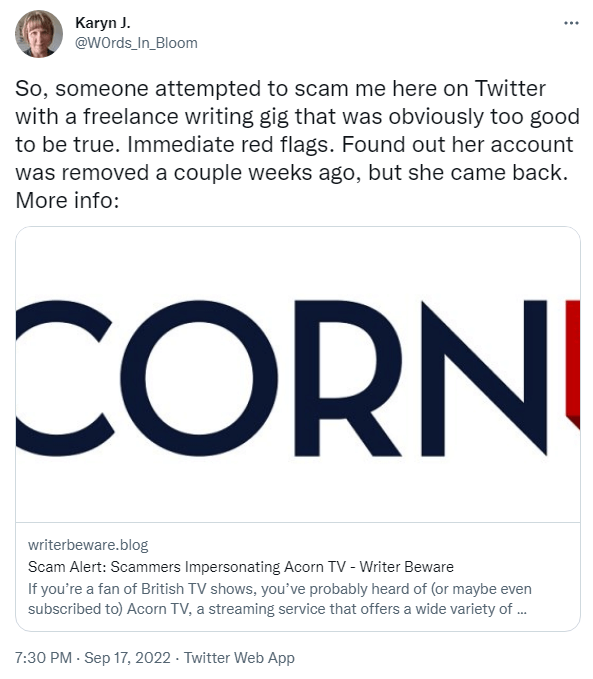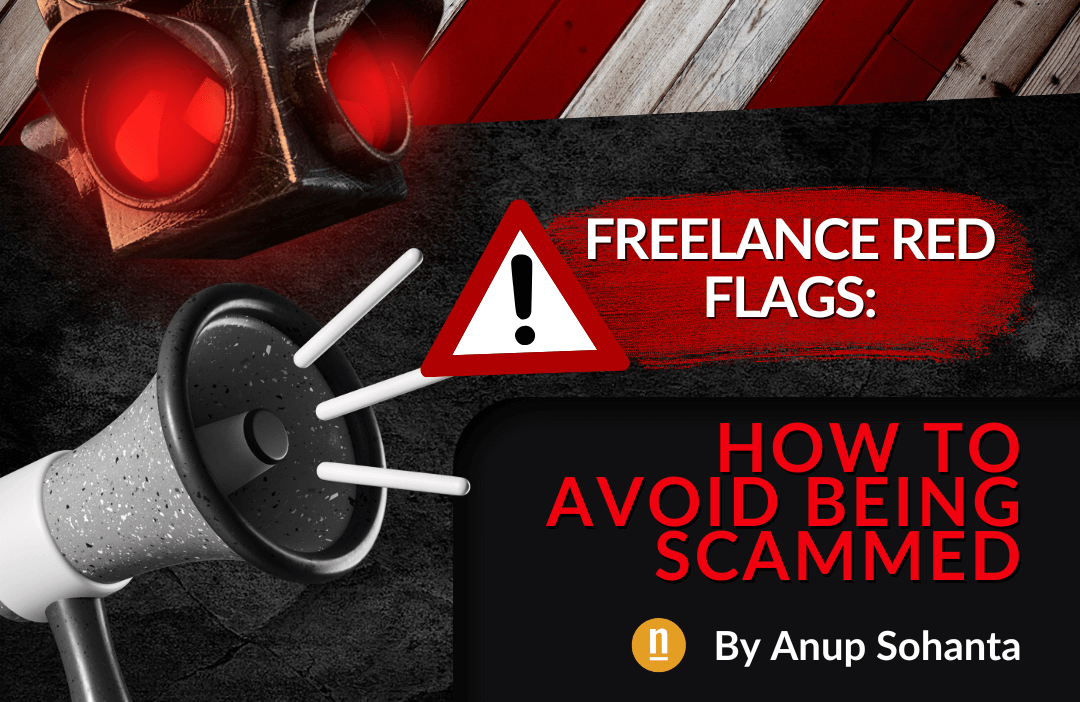Working for yourself as a freelancer can be very lucrative. It can provide you with greater flexibility and the ability to charge your own rates. However, it’s vital to be weary of scammers and potential clients that may be looking to take advantage of you.
In a survey by Flexjobs, 17 percent of the 2,600 respondents stated that they had fallen victim to a job scam at least once. It’s also important to note that 20 percent of Millennial respondents (aged 20-29) reported being scammed, which was higher than senior respondents aged 60-69.
It’s important to look out for freelance writing scam red flags to keep yourself safe; in this post, you’ll learn how to spot red flags and avoid being scammed, alongside vetting potential clients.
Examples of Freelance Writing Scam Red Flags
For freelancers that are new to the industry, it can be common to fall into traps. Some of those scams may look like providing work upfront without no guarantee of being paid. Another may look like being asked to provide additional deliverables or revisions without the discussion of cost.
Here are some examples of red flags to beware of.
Red Flag: Asking for a Trial Assignment Without Pay
There are certain content writing marketplaces that don’t vet brands enough, and this results in writers being scammed because the client asks for a “trial assignment.” A trial assignment is when a client asks you to produce a piece of content to see if you’ll be a good fit.

It’s not uncommon for a freelance writer to be asked to provide their deliverable before seeing any payment. But, if you’re sourcing clients from a marketplace, then it’s crucial to ensure they’re legitimate or the marketplace has a good reputation.
Red Flag: A Brand Contacting a Writer Out of the Blue
If you have a website or freelance portfolio on the internet, it may not be unusual for clients to contact you out of the blue. Sometimes, this can be a complete scam with potential clients that want to take advantage of you. For Kathryn Johnson, a scammer tried to contact her with a too-good-to-be-true gig on Twitter, pretending to be a well-known streaming service.

This is where vetting clients come into play, as Kathryn had to search for the client and the contact to establish their credibility. If you’re faced with this situation and research hasn’t given you a clear resolution. You can either try to contact the company directly through other channels or ask the contact to provide more information. If you’re still not sure, then it’s totally okay to avoid that client altogether.
How to Avoid Freelance Scams
When you’re working for yourself, avoiding people that try to take advantage of you is part of the job. As a freelancer, there is most likely plenty of people trying to scam you, making it even more important to be vigilant.
Here are a few freelance scams and how you can avoid them:
- Easy job for high pay: One of those too-good-to-be-true jobs, which could involve high pay or even a dream client that doesn’t exist. This can be a huge potential red flag. So it’s important to research the client thoroughly. Another thing to watch out for is the rate the client is offering compared to the market rate.
- Paying for a client list: There are legitimate client lists. However, if a company offers you a list of clients looking for your services, then it’s a scam. From my experience, clients looking for copywriting or content creation don’t usually become part of these lists. You can find clients on multiple content writer marketplaces alongside on nDash for free.
- Staying on professional channels: Are you sourcing clients through platforms? One of the most effective ways to stay safe is to stick to their messaging system. You’ll find it within the platform. It helps to provide you with credibility for the terms of your agreement and keeps all of your correspondence secure.
- Unusual payment methods: When clients offer to pay you via unconventional methods, it’s a huge red flag. On the odd occasion, this may be completely legitimate. But for your own safety, stick to methods like the platform’s payment method, PayPal, Stripe, or bank transfers.
How to Avoid Being Scammed as a Freelancer
As a freelancer, you’re responsible for the decisions that you make. They guide your business in the direction of growth and profitability. One of the most essential aspects of building your business is being able to decipher who is trying to scam you or not. When looking for red flags, remain vigilant and try to vet potential clients as much as possible. Ask questions about the specifics of the work that the client is looking for and also send them a contract if possible.
For a secure writing marketplace that’s open to writers in a variety of niches, check out nDash.
FAQs About Freelance Red Flags
How do I know if a freelance job is legit?
Search for the company and the contact to establish if it’s a credible job. Furthermore, you can contact the brand directly to establish if the job is legit.
How can a freelancer avoid being scammed?
The best way to avoid being scammed is to do your research on the company. Look at its website, check LinkedIn, and also establish terms via a contract.
When should you turn down freelance work?
Trust your gut. If something feels off about the job, then it’s totally okay to turn it down. Furthermore, if the rate feels too good to be true or is too low, then it’s okay to turn it down.
 About the author:
About the author:
Anup Sohanta is a freelance writer and poet who specializes in developing content and content strategies across multiple channels to drive engagement and positive growth. Check out his profile to learn more about what he can do for you today!

